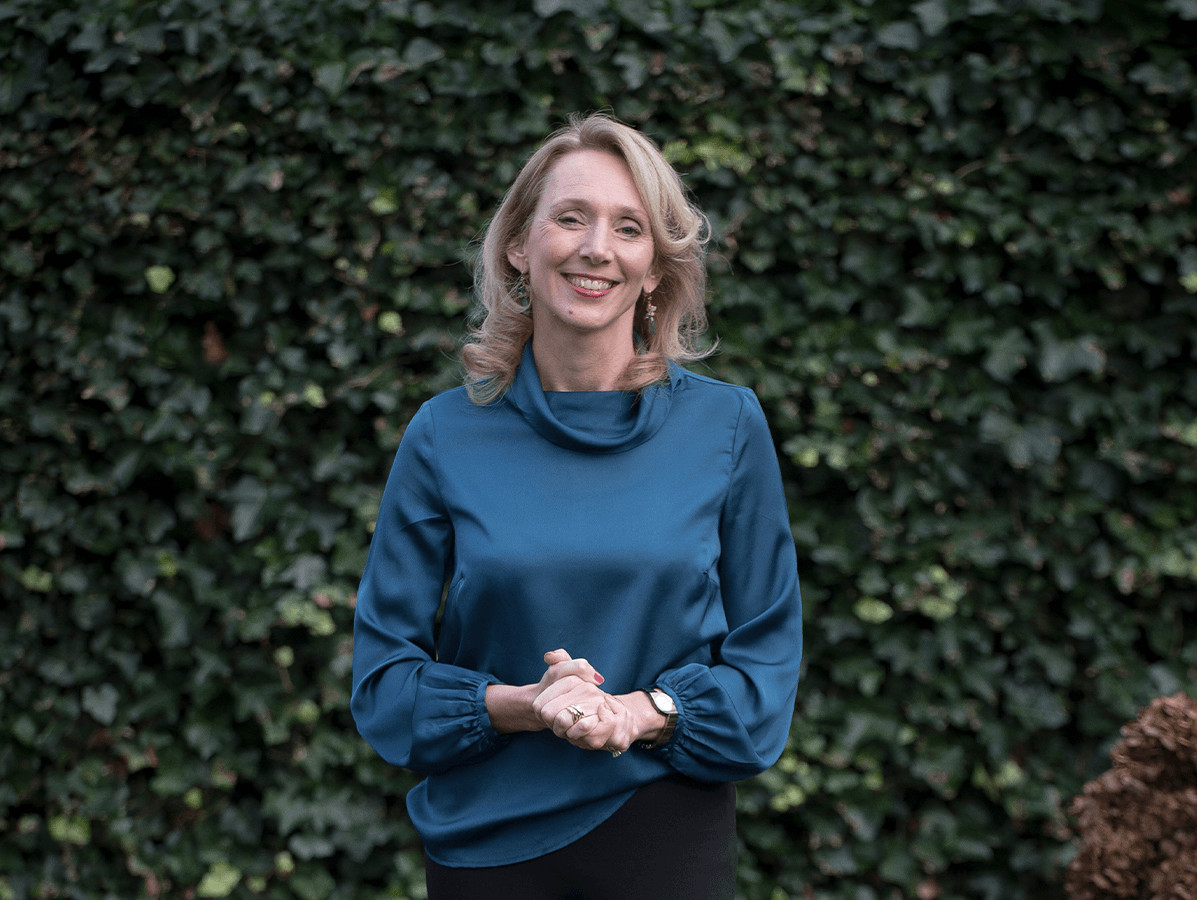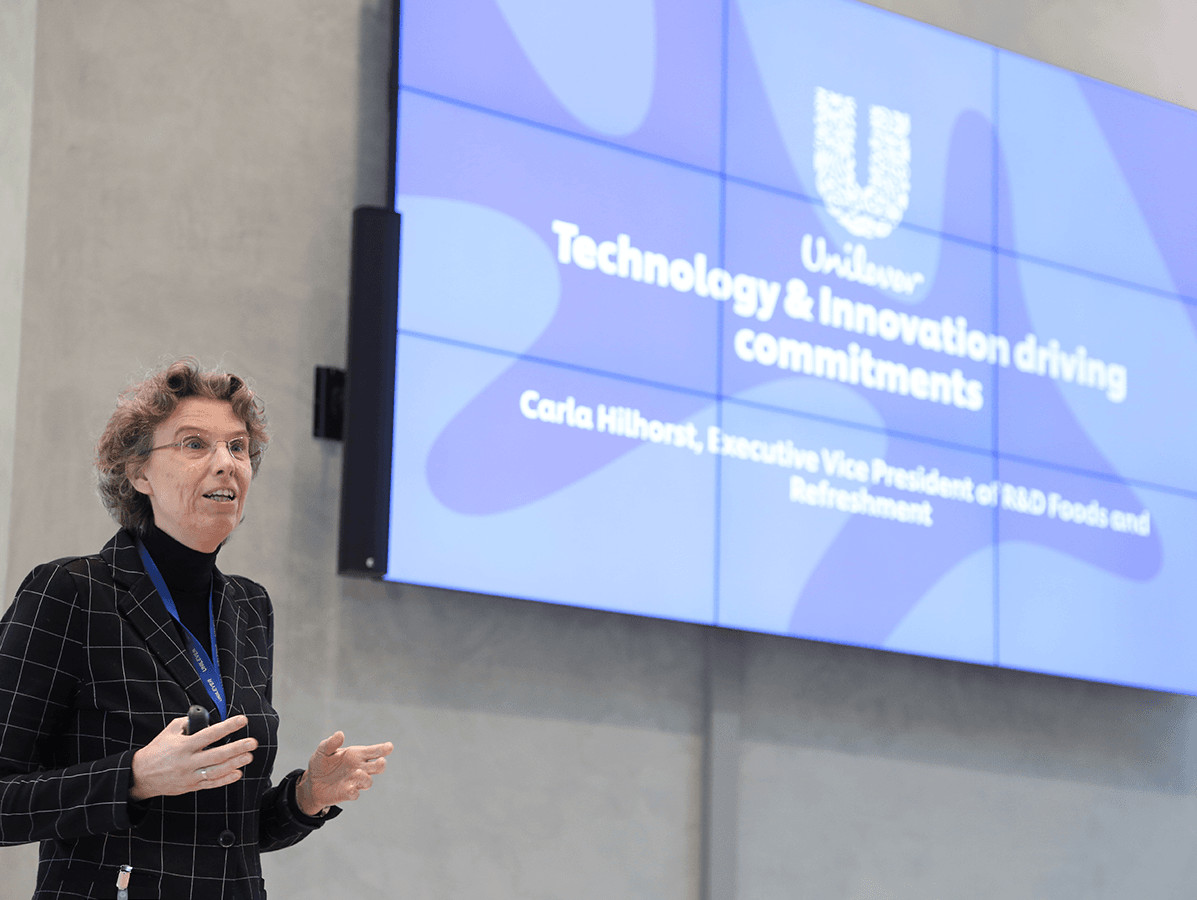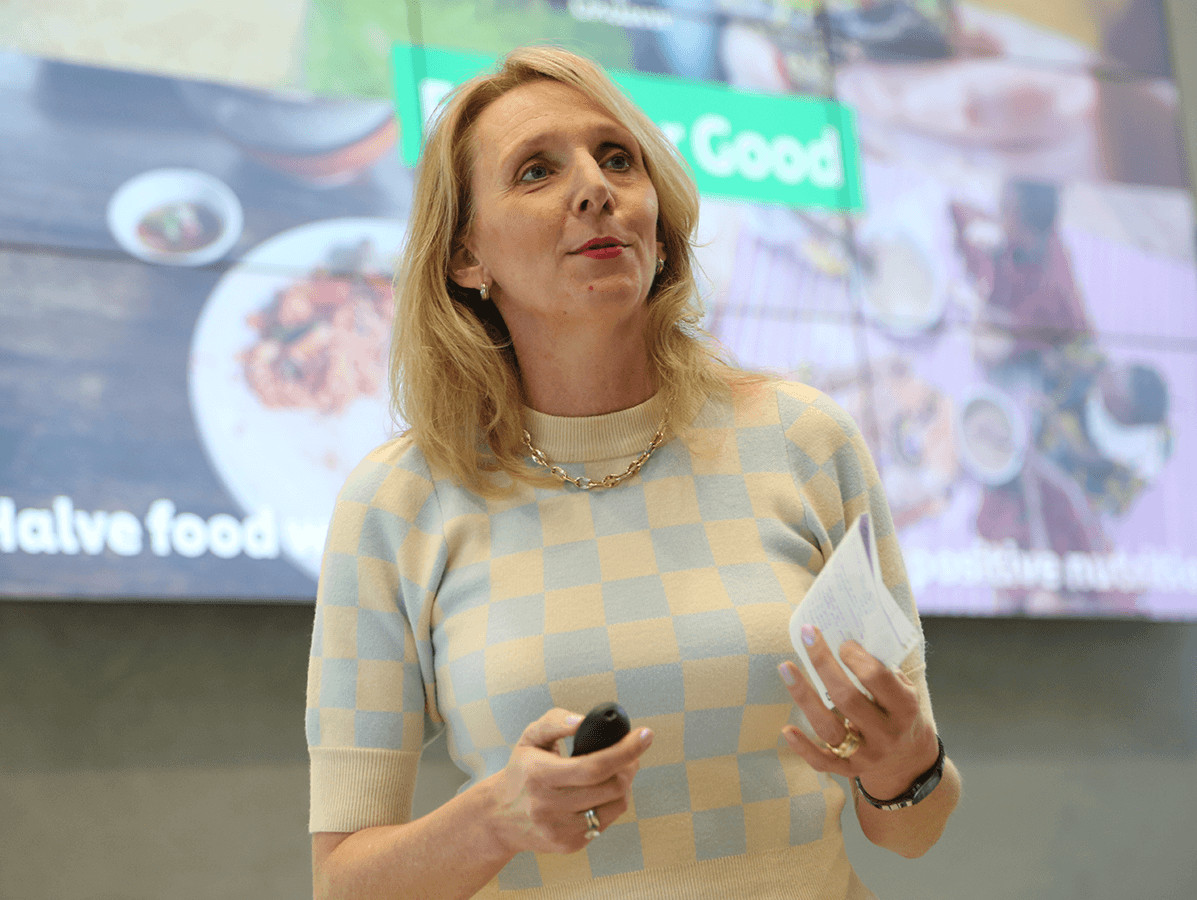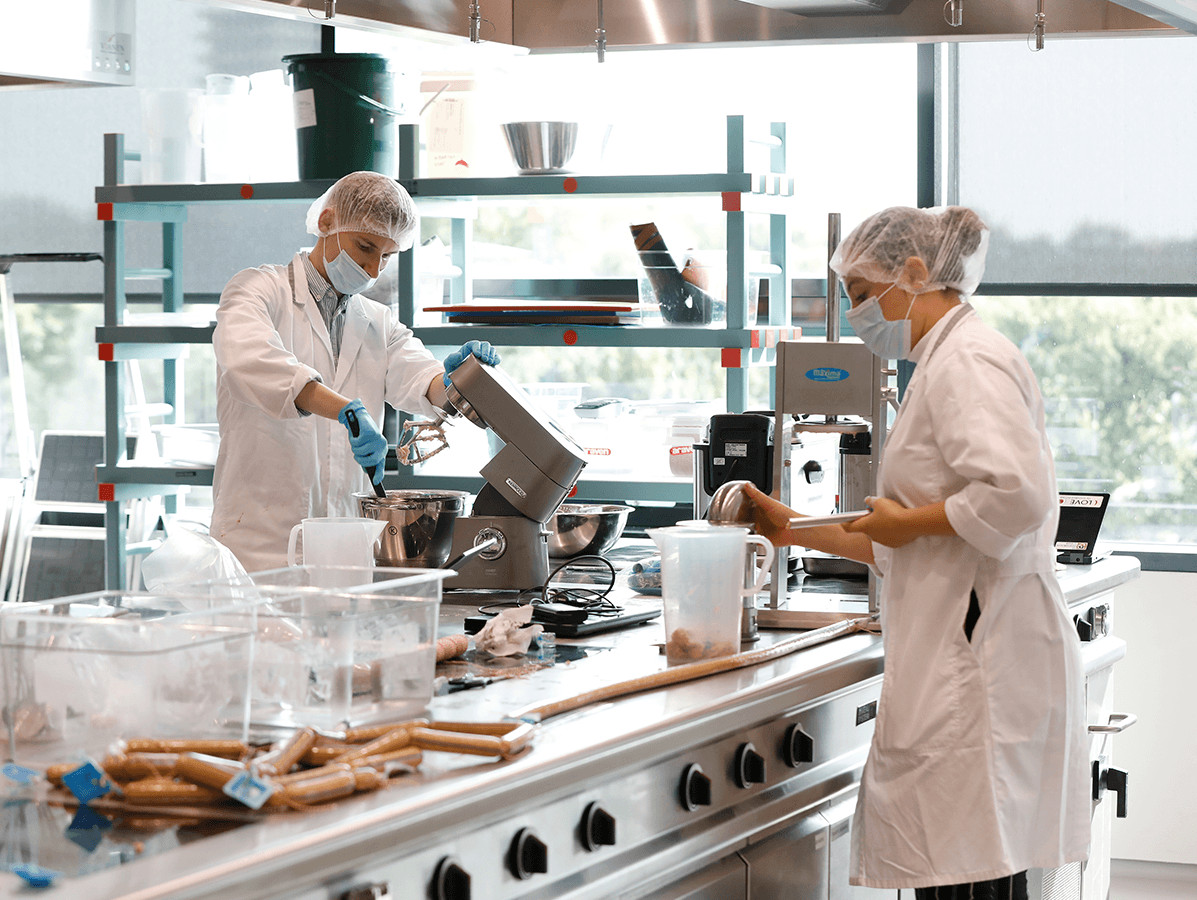
Unilever's Foods Innovation Centre in Wageningen 'Hive', opened its doors at the end of 2019. As Hive strives for openness and transparency, the idea was to host many stakeholders and interested parties from the start, but then, covid. Unilever top woman Hanneke Faber opened a 'Hive Deep Dive' for journalists on 28 February. 'You are actually the first ones we are welcoming'.
'Digital modelling makes us more flexible in overcoming difficulties'
Whoever enters the 'Hive' for the first time walks around with their mouth open from surprise and amazement and with a stiff neck from looking up. The building, constructed largely of wood and glass, oozes sustainable progress. Unilever's Foods Innovation Centre in Wageningen is a cathedral for plant-based food. Not a cathedral where mere words are circulated, but one where answers to the food questions of the next hundred years are worked on with dedication. Yes, of course the concern uses grand words. Unilever wants to be a 'force for good'. But you can certainly say that when you invest a billion euros in the development of plant-based food.
We have often heard Hanneke Faber, president global foods & refreshment at Unilever, say. "Unilever is not a charity!" The fact that plant-based food is at the heart of Unilever's business strategy means that much is expected of it. "It works! Plant-based is growing at 6 per cent annually, we are improving margins, we are determined to surpass the competition." To make that happen, there is a lot of innovation going on in Wageningen, where approximately 500 food scientists walk around in Hive, 500 Gyro Gearlooses, looking for plant-based products with the right taste, texture, smell, colour and mouth feel. And that is necessary, says Faber, because food products are not in the best of shape at the moment. "Of course, food is fun, food is sexy, but we also have to deal with problems. There is a lot of hunger on one hand, there is overweight and obesity on the other. Fifty per cent of emissions are caused by animal food, especially beef, and then there's waste..." So there is work to be done.
For those who think that this means that the 500 Gyro Gearlooses are all looking for the golden formula, Carla Hilhorst, executive vice president R&D Foods & Refreshment at Unilever, has a discouraging announcement. "There is no such thing as 'the silver bullet'. The magic is always in the combination of different things. We are always busy discovering yet another magical recipe." The well-known obvious factor here is that taste is success factor one, two and three. And that the first requirement for success is a fundamental consumer drive. "You have to know very well what consumer problem you are solving. Consumer insights are very important: every opportunity to improve an inadequate diet is one. That is why we are very attached to co-creation with consumers. In the kitchen together. Working together. Engaging in dialogue." This also provides the opportunity to tap into established patterns of behaviour.

'Hacking' is how they call it at Unilever. There is no point in subjecting people to major changes. If they can eat more vegetarian, without breaking their fixed patterns and without compromising on taste and cost, then the chances of success are much greater. One product that has been 'designed' with this philosophy in mind is Rinde Mas. This is now only available in three South American countries under the Knorr brand and is designed to make 21 instead of 14 meatballs ('albigondas') from one pound of minced beef. It does not take a mathematical genius to see that the emissions associated with livestock farming can be greatly reduced if the product is embraced by a wide group.
"The most well-known 'hacks' are the meat products that are replaced one on one by vegetable meat substitutes, sausages and burgers; of the Vegetarian Butcher, for example, which are being improved little by little. Recently Unilever launched a further improved vegetable mince under the same brand, which looks more convincing as raw mince, contains fat particles of coconut fat and also behaves more like real mince when prepared. A great improvement on the brown roasted 'cooked' veggie mince that we started the revolution with."
Data collection is one of the spearheads in Unilever's food innovation process. Everything is recorded; every gram of an ingredient added to something is a new data point. Data that is fully exploited for modelling purposes. Faber, asked about the hurdles that still have to be taken in the area of health, says, for example, that if you want less salt in your product, there are thousands of options to achieve a tasty product. "That's where we call in our big data specialists, who in an hour's time can use digital modelling to report on the options that are likely to work best."
Incidentally, it is not the case that digital modelling is only used when developing new products. Faber: "During covid, we were faced with a less stable supply of ingredients. That requires creativity. If you normally use salt from Israel and are forced to switch to salt from Egypt - and yes, there is a difference between the two - you have to tinker to achieve the same end product. Because we are able to use digital modelling, we are a lot more flexible. We can overcome difficulties more easily."

With a little imagination, food production plants can be called "giant kitchens". Unilever has quite a few of these around the world. To what extent does innovation, new development, take into account the idea that production can be carried out, in full or in part, on existing factory lines? The answer lies in combining, says Faber. "You cannot combine a factory line that produces meat products, for example, with plant-based ones. We keep that strictly separate. To use existing lines for new - plant-based - products, we usually have to make adjustments to a greater or lesser extent."
An equally important development is the further automation of factories. Not in order to save on manpower. It is rather the other way round. Unilever is facing a growing shortage of labour. "It is already a problem and it will only get worse. We need to address the labour shortage." Can Faber name specific technologies in which Unilever will invest? "Yes in robotics. Things that people did will increasingly be carried out by robots, on the one hand in order to meet the growing shortage of labour. On the other hand, the advantage is that the work that remains becomes much more attractive. It is a crucial development if we want to continue to be able to feed the world. The big kitchens should run!"
Back to Carla Hilhorst, who we can safely refer to as Hive's chief technologist. She is convinced - and thus also expresses one of Unilever's beliefs - that technology is indispensable in feeding the world. A global trust in technology is therefore crucial. But that is something of a challenge. There are plenty of critics. And led by parties such as the Consumers' Association, the somewhat militant Foodwatch and programmes such as the Dutch Food Inspection Service (Keuringsdienst van Waarde), the food industry is regularly under fire. How does Hilhorst propose to improve that trust? It is of course a problem of perception, because food that is super safe is not always regarded as safe. 'Simplicity of ingredients' and that is based on two things. Ingredients should preferably be as recognisable as possible as an ingredient in a consumers' kitchen and the list of ingredients should be as short as possible. "So we'd better put vitamin C on the label rather than ascorbic acid, because many people don't recognise that."

When developing plant-based variants of existing products, it can be complicated. Egg yolk (a deliciously recognisable ingredient that doesn't give consumers the jitters) serves as a binding agent in mayonnaise. If you make a vegan version, as Unilever has done under the Hellmann's brand, the egg yolk has to be removed, but you still have to produce a mayonnaise with a structure close to that of the original. And: no mumbo jumbo on the label. Hellmann's manages to keep the ingredient list to ten. The most difficult ingredient is probably 'antioxidant E385', a synthetic salt often used in yellow sauces. The binding comes from 'modified maize starch'. A recognisable ingredient, although many consumers will question the modification. It has nothing to do with genetic modification, but Unilever cannot avoid mentioning it on the label, because it is obligatory. So they have come a long way, but something is still left to be desired. Hilhorst also knows that trust is not a fixed space. "What is trusted today may not be trusted tomorrow and vice versa." It is therefore an issue that requires constant monitoring."
The same technology is also vital in 'designing' foods for different diets and even regions. After all, "nutritional value is not 'one size fits all'." Meat eaters, for example, are lacking in dietary fibre and vitamin E, while vegetarians and vegans need supplements of vitamin B12. Hilhorst: "We supplement our plant-based products with the necessary nutrients. Different regions have different challenges. In sub-Saharan Africa, too many starchy products are eaten, and in the United States there is a lot of beef and dairy. These are starting points for developing new products." This led, for example, to adding iodine to Royco chicken soup, because children in Africa do not get enough of it. In Ethiopia, zinc is added to bouillon cubes due to a shortage.

But sub-optimal food values are not just a third world problem. According to Hilhorst, half of us have to deal with it too. The Netherlands - don't be alarmed - has the lowest vegetable intake in all of Europe. The good news is that Dutch consumers tend to follow the recipe on the box. Hilhorst: "It is therefore very easy to help the Dutch to change their eating habits by putting healthier recipes on the packaging. This principle is also applied in other countries."
Finally, a brief mention of the order of things. It was in late 2019 that Unilever opened its innovation centre in Wageningen. Roughly a year later, the company decided to leave the Netherlands and set up its headquarters (solely) in the UK. (Ouch for the Netherlands.) Should we be worried that this innovation centre will also be moved to the UK? Faber's words are reassuring. "We are right here. This is the epicentre of our innovation machine. We love it here and we're staying. Since we chose the UK, we have hired 300 more people in the Netherlands. Need I say more?"
Source: Vakblad Voedingsindustrie 2022